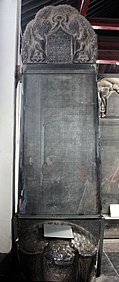
Back تقويم سلوقي Arabic تقويم سلوقى ARZ Эра Селеўкідаў Byelorussian সেলেউসিড সাল Bengali/Bangla Era Selèucida Catalan Seleukovská éra Czech Seleukidische Ära German Era seléucida Spanish سالهای سلوکیان Persian Seleukidinen ajanlasku Finnish
The Seleucid era ("SE") or Anno Graecorum (literally "year of the Greeks" or "Greek year"), sometimes denoted "AG," was a system of numbering years in use by the Seleucid Empire and other countries among the ancient Hellenistic civilizations, and later by the Parthians. It is sometimes referred to as "the dominion of the Seleucidæ," or the Year of Alexander. The era dates from Seleucus I Nicator's reconquest of Babylon in 312/11 BC after his exile in Ptolemaic Egypt,[4] considered by Seleucus and his court to mark the founding of the Seleucid Empire. According to Jewish tradition, it was during the sixth year of Alexander the Great's reign (lege: possibly Alexander the Great's infant son, Alexander IV of Macedon) that they began to make use of this counting.[5] The introduction of the new era is mentioned in one of the Babylonian Chronicles, The Chronicle of the Diadochi.[6]
- ^ Tang, Li; Winkler, Dietmar W. (2013). From the Oxus River to the Chinese Shores: Studies on East Syriac Christianity in China and Central Asia. LIT Verlag Münster. p. 131. ISBN 978-3-643-90329-7.
- ^ Holm, Frits Vilhelm (1909). "Translation of the Nestorian Inscription". The Nestorian Monument: An Ancient Record of Christianity in China. The Open Court Publishing Co.
In the year of the Greeks one thousand and ninety-two, the Lord Jazedbuzid, Priest and Vicar-episcopal of Cumdan the royal city, son of the enlightened Mailas, Priest of Balach a city of Turkestan, set up this tablet, whereon is inscribed the Dispensation of our Redeemer, and the preaching of the apostolic missionaries to the King of China. ["The Priest Lingpau", in Chinese] "Adam the Deacon, son of Jazedbuzid, Vicar-episcopal. The Lord Sergius, Priest and Vicar-episcopal. Sabar Jesus, Priest. Gabriel, Priest, Archdeacon, and Ecclesiarch of Cumdan and Sarag.
- ^ Wilmshurst, David. A Monument to the Spread of the Syrian Brilliant Teaching in China (PDF). p. 9.
- ^ Denis C. Feeney, Caesar's Calendar, University of California Press, Berkeley 2007, p. 139.
- ^ Babylonian Talmud (Avodah Zarah 10a), Rabbeinu Hananel's Commentary; RASHI's commentary on Babylonian Talmud (Avodah Zarah 9a); Sefer Hakabbalah of Rabbi Avraham ben David (Ravad); Midrash David on Mishnah Tractate Avot (Ethics of the Fathers, 1:6)
- ^ Babylonian Diadochi Chronicle (BCHP) 3 Archived 2017-07-22 at the Wayback Machine; obverse, line 4.


